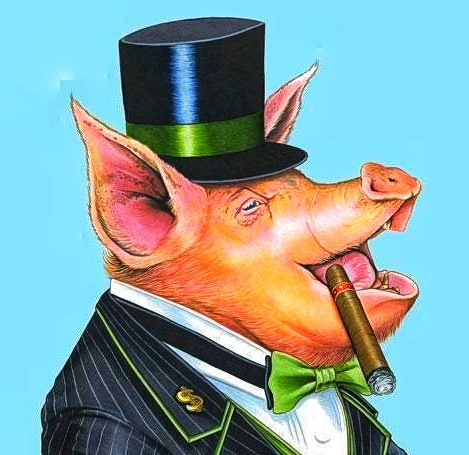I know there are lots of everyday moments of humans being kind to each other, but do you have any good examples on a wider scale to counter that capitalist realist idea?
I usually try and invoke the fact that humanity for hundreds of thousands of years lived in tribes where they had to co-operate or they would die and that "human nature" is just the product of the system under which you live, but are there any better examples you've found to convince your lib acquaintances?
I feel like one of the major hurdles towards getting somebody to become a leftist is the idea that humanity can, if organized democratically and if properly educated and with the right ideas of solidatory instilled, create a better system than the capitalists or technocrats have created. It's easy to look around and superficially see everybody as bumbling idiots or greedy assholes, particularly if you're socially atomized and apathetic, and so conclude that the working class, if left to it's own devices, would infight and crumble.
Or is this just one of those axiomatic things where if somebody you know believes it, it's very difficult to make them not believe it through historical examples unless they do major soul searching after a personal crisis?
Graeber's new book The Dawn of Everything is filled with examples of human societies constructed explicitly against impulses like greed and selfishness. Like dozens upon dozens of examples of exactly what you're looking for.
he even has a few examples of cities of tens of thousands of people self-organized in this way that really put the lie to the presupposition that these modes of social organization inherently break down at scale.
https://www.theguardian.com/books/2020/may/09/the-real-lord-of-the-flies-what-happened-when-six-boys-were-shipwrecked-for-15-months
Also any stories of large scale disasters people usually help each other :shrug-outta-hecks:
Protests against the Iraq war were the largest in the entire world. Even though people were scared and the propaganda machine was on 110%, people still recognized that the war will be disastrous for everyone whether they were involved or not.
The book HumanKind by Rutger Bregman should be exactly what you're looking for. He's a center left humanist, so there's no real political theory involved, just simple historical/anthropological examples of humans being predisposed to cooperation (and debunking popular examples demonstrating a selfish human nature)
OP is looking for actual examples that he can use to convince others. Nobody is going to believe that just because Marx said so.
Here's the thing, capitalist realism has so captured peoples minds that they have become incapable of understanding the breathtaking level of trust that goes into our every day lives. Our complex and highly specialized society only functions because of the unacknowledged assumption that everyone around us will behave in a prosocial manner. The fact that we are willing to work for a wage shows immense trust that we will get paid at all and that what we will be paid in is something that has this nebulous concept of value that only exists because of the continuing existence of this social trust. As with all things capitalism only "creates" by enclosing a commons created by all and expropriates value from it without contributing, in this case the common pool of love for person to person. The fact of the matter is that on the whole humans have to be abused and coerced into being antisocial beings, and yet even after all the abuse we collectively take from our sociopathic society those dripping in the ideology of the bourgeois have the gall to ask us for some exemplary PROOF of humanities innate prosociality. And yes there are always people and contexts who will act in an antisocial manner. I speak in terms of statistical distributions and on the median people are much more social than anti social, were this not the case society itself could not exist.
On mobile so I can't do fancy research and links, but I recall a story of an anthropologist being asked a question of a similar nature, basically "how do we know early humans were cooperative" and she gave the example of one of the ealiest bones we have on record is a femur, and whats remarkable is that it shows signs of being broken but having healed, even getting to old age. She explains it's remarkable because the femur is a critical bone, clearly, and super hard to break yet despite lack of modern medicine someone bothered to care for someone else with a life-ending injury until they could get better. Not like you can do much hunting or gathering with a broken femur after all
Always think of this passage from Kurt Vonnegut’s “Wampeters, Foma, And Granfalloons”:
“[Dr. Robert Redfield] acknowledged that primitive societies were bewilderingly various. He begged us to admit, though, that all of them had certain characteristics in common. For instance: They were all so small that everybody knew everybody well, and associations lasted for life. The members communicated intimately with one another, and very little with anybody else.
“The members communicated only by word of mouth. There was no access to the experience and thought of the past, except through memory. The old were treasured for their memories. There was little change. What one man knew and believed was the same as what all men knew and believed. There wasn’t much of a division of labor. What one person did was pretty much what another person did. “And so on. Dr. Redfield invited us to call any such society ‘a Folk Society’…. In a folk society, says Dr. Redfield, and I quote him now:
“‘[B]ehavior is personal, not impersonal. A “person” may be defined as that social object which I feel to respond to situations as I do, with all the sentiments and interests which I feel to be my own; a person is myself in another form, his qualities and values are inherent within him, and his significance for me is not merely one of utility. A “thing,” on the other hand, is a social object which has no claim upon my sympathies, which responds to me, as I conceive it, mechanically; its value for me exists in so far as it serves my end. In the folk society, all human beings admitted to the society are treated as persons; one does not deal impersonally (“thing fashion”) with any other participant in the little world of that folk society.
“‘Moreover [Dr. Redfield goes on], in the folk society much besides human beings is treated personally. The pattern of behavior which is first suggested by the inner experience of the individual—his wishes, fears, sensitivities, and interests of all sorts—is projected onto all objects with which he comes in contact. Thus nature, too, is treated personally; the elements, the features of the landscape, the animals, and especially anything in the environment which by its appearance or behavior suggests the attributes of mankind—to all these are attributed qualities of the human person.’
“And I say to you that we are full of chemicals which require us to belong to folk societies, or failing that, to feel lousy all the time. We are chemically engineered to live in folk societies, just as fish are chemically engineered to live in clean water—and there aren’t any folk societies for us anymore.”
Continues along:
“If we become increasingly apathetic in modern times - well, so do fish on river banks, after a little while. Our children often come to resemble apathetic fish - except that fish can't play guitars. And what do many of our children attempt to do? They attempt to form folk societies, which they call "communes." They fail. The generation gap is an argument between those who believe folk societies are still possible and those who know they aren't.
Older persons form clubs and corporations and the like. Those who form them pretend to be interested in this or that narrow aspect of life. Members of the Lions Club pretend to be interested in the cure and prevention of diseases of the eye. They are in fact lonesome Neanderthalers, obeying the First Law of Life, which is this: "Human beings become increasingly contented as they approach the simpleminded, brotherly conditions of a folk society."
Only possible in a socialist system, in which inter-personal relationships are not commodified as we currently are overwhelmed by today.
Carlin speaks pretty profoundly about this subject too. Will see if I can find some stuff later…
sorry im not taking time to re-find it but there were documentary and interviews with remote tribes on isolated islands in the Indian ocean, South Pacific, elsewhere. Some of these people had easy access to food and water seasonally and the talked about just vibing and chilling and being thankful for the gifts from the land. And they seemed to mostly all get along together.
AFAIK this largely stems from two places, "The Selfish Gene" and protestant brain "original sin".
Can't really do much about Prot brain, but you could check out Jonathan Haidt who has some beef with "The Selfish Gene."
For nearly 50 years scientists have generally agreed that selfish genes shaped human nature to be mostly selfish, with exceptions made toward kin, partners in reciprocity, and a few other cases. Group selection was banished from respectable discourse. But recent findings from multiple fields have re-opened the question. Haidt showed that human nature appears to have been shaped by natural selection working at multiple levels, including not just intra-group competition but also inter-group competition. He suggested that we have in our minds what amounts to a “hive switch” that shuts down the self and makes us feel, temporarily, that we are simply a part of a larger whole (or hive). This uniquely human ability for self-transcendence is crucial for understanding the origins of morality and religion.
https://hecc.ubc.ca/jonathan-haidt-the-groupish-gene/
I haven't read his books but I saw that lecture a while ago and thought it was good.
I dont think that's quite correct. "selfish" gene is just a catchy title some publisher came up with, it has nothing to do with human selfishness. That paragraph seems to confuse different things. While group selection is disafavoured within the scientific community, that's not about selfishness. Scientists have understood the evolution of altruism under the "selfish" gene for as many decades.
Group selection does not equal selflessness and gene-centric selection does not equal selfishness. This is a debate that is not fully settled and it's about the so called "unit of selection". Does evolution operate mainly at the level of genes, individuals or populations? It's not about selfishness in any meaningful way though it's easy to see how a term like "selfish gene" can be easily eaten up by bootlickers and reactionaries.
Oh, I was specifically referring to Dawkins' book as in "Alot of people get this idea about natural selfishness from Dawkins [and protestantism,] here's someone who disagrees with Dawkins' conclusion.
If I understand it right Dawkins didn't even think it was necessarily correct.
I think, in a sense, Darwinism can be applied to social relations, and what we see is that evolutionary pressure has selected for humans to be social and cooperative by nature (it is to the benefit of the proliferation of humanity to be cooperative). The sort of feudal idea of "I could kill my neighbor and take his stuff and be richer" is correct, but there is some force in human society which prevents us from living like this. One could argue it is the state, but the state has not always existed and certainly so in its current form. The state is also a manifestation of social relations (if for instance, humans all decided to kill our neighbor and take his stuff, the state would not exist), so even in this Hobbesian line of thought, there is a tendency towards submission to the greater good.
Of course I am not a Hobbesian and I think what we see is that the division of labor allows for a greater production, therefore a greater surplus, and therefore a greater proliferation of humanity. A division of labor necessitates a degree of social trust though and since the division of labor predates the state apparatus, that trust must be somewhat innate to our genetics. Indeed we see things like the ability to remember human faces or our wide vocal range which must have evolved for a socially cohesive unit. We see these traits in many other creatures with social systems.
All of this is to say, that we did in fact evolve as social creatures and whether that social fabric is maintained through collective violence against those who violate it or that we recognize our common material interest in social cohesion, we are by nature collaborative and respectful of one another rather than constantly seeking to exploit, It is the selective factors of the bourgeois market, a system thrust upon us by the bourgeois class, which promotes greed. There might be an argument that the market is a natural outgrowth of accumulation (a very deterministic approach though not entirely out of line in Marxism), but this has as much merit as the counterargument that the market will be overthrown for planned production based upon cooperative human nature.
I see everyone in the comments referencing pre-capitalist human civilizations. I’m not sure we can ever get back to that level of selflessness and community in our atomized modern world. The decline in living standards and climate crisis will necessitate cooperation, hopefully








